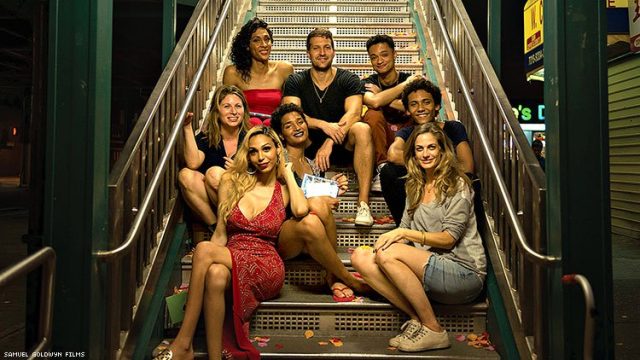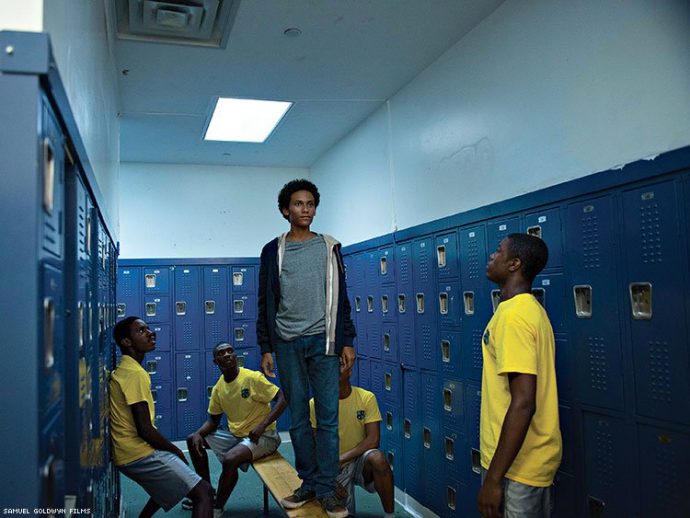
A new movie explores the search for identity among the grittiness and beauty of New York’s homeless LGBT youth.
In an era when many films tend to cater to a box office formula, one story sticks out: Saturday Church, written and directed by Damon Cardasis. Critics are calling it “Moonlight meets La La Land” due to its poetic and emotional storytelling mixed with minor musical moments that run deep into the heartstrings.
The film’s lead character, Ulysses (Luca Kain), is a shy and effeminate boy who, after the death of his father, finds himself struggling with his gender identity under the eyes of his striving mother, Amara (Margot Bingham), and abominable Aunt Rose (Regina Taylor) — the latter ends up kicking him out on the street after discovering he’s been wearing his mom’s clothes in secret.
With a mixture of emotional depth and fluid choreography layered throughout the film in its most poignant moments, Cardasis leads Ulysses to New York City’s West Village, where he meets other transgender youth who’ve found a family at “Saturday Church” — based on the Art and Acceptance program held Saturday nights at the Church of St. Luke in the Fields in Greenwich Village, which offers LGBT homeless youth temporary shelter, food, and companionship.
According to a 2012 study by the Williams Institute, LGBT youth represent 40 percent of the 1.6 million young people experiencing homelessness in the United States. Cardasis knew from the beginning that Ulysses’s story was universal to many young teens across the country. For him, it was a responsibility to not only make the story real, but to make it true.
“People say, ‘Congratulations!’ which is obviously lovely to hear, [but] I never have those moments of being like, ‘You’re welcome,’” the first-time director explains. “For me, I feel like I gave birth to something. I don’t have a child, but I imagine what it must feel like. I’m so happy for the child.”
Cardasis wanted to find actors who knew about the issues affecting LGBT youth, which is why he messaged Jose Gutierez Xtravaganza, of the House of Xtravaganza, to find actors willing to portray these stories on-screen. As fate would have it, Xtravaganza connected Cardasis to two girls who had never auditioned before: India Moore and Alexia Garcia. Both of them ended up landing lead roles, and they are now starring in Ryan Murphy’s new show Pose.
In the film, Kain’s character becomes so enriched by the compassion bestowed upon him by people he meets at Saturday Church — including Joan, the program’s organizer, played by nonbinary author and playwright Kate Bornstein in their first major acting role — that he ends up finding courage to stand as his authentic self, an experience Cardasis drew from his own life.
“I remember coming out [at 17] and being with gay guys for the first time. All of a sudden, small things can be reaffirming,” he says of the bravery of coming out at a young age. “In some ways coming out of the closet is saying, ‘This is who I am and I’m almost willing to give up everything I’ve had in my life so far to be who I truly am. And you can come along for the ride or not, but I’m not going to be what I’m not.’ What’s scary after that? You’re willing to risk everything.”

In the end, Ulysses finds a new family in the ballroom scene of New York City and is beautifully validated by his mother upon returning home.
Cardasis says he didn’t want the movie to feel “voyeuristic or exploitative,” admitting he’d sent the script to GLAAD, social workers, and members of the ballroom scene for comments. Everyone gave the green light, something later affirmed when audiences started sending the director messages on social media — including from Moore herself — with words like “Thank you for making me proud to be me.”
“I think there’s something so freeing about owning your space, that it’s one of the most difficult things probably most people can go through in their lives, but once you do it, it frees you up in so many other areas,” Cardasis says of one’s search for identity, one of the film’s notable themes. “There are times in life when you have to say, ‘This is me, and I’m owning me — no matter what my family thinks or my church thinks. This is me, take it or leave it.’ Once you do that, then [other decisions] become trivial, and you’re [less] paranoid about what people think. Once you own yourself and say this is me no matter what, you don’t give a fuck about other things.”
Stories like Ulysses’s are far too common yet seldom told in major markets. With a cast of mainly black trans actors, as Saturday Church hits theaters, on demand, and digital release, it is sure to make an impression on moviegoers. Cardasis hopes it will inspire others to go beyond their limits.
“When you see that other people feel the same, think the same, have the same ideas, you don’t feel crazy. You sort of realize, ‘Oh, there are other people like me out there.’ It’s supportive. It’s a community. There’s a lot of love. It’s empowering. Then you sort of blossom.”







